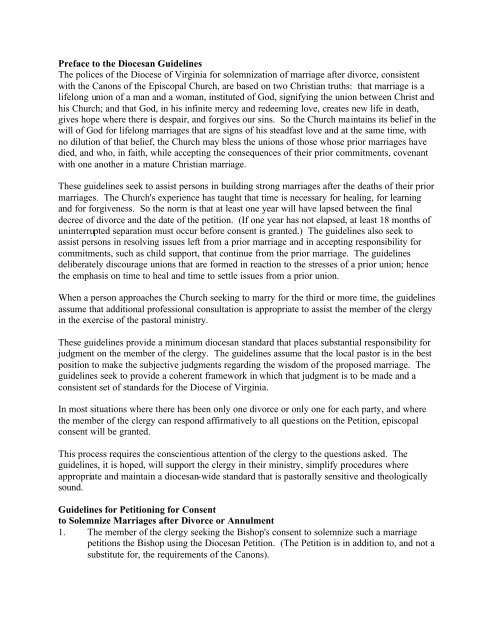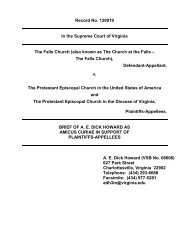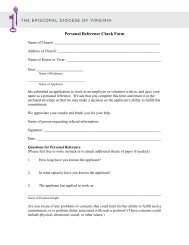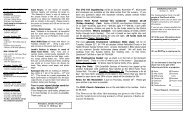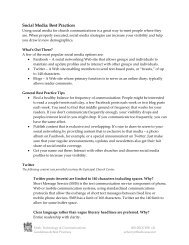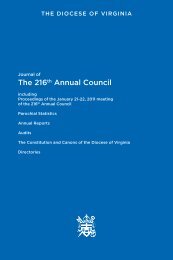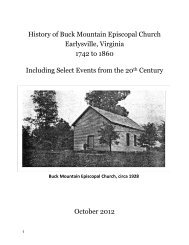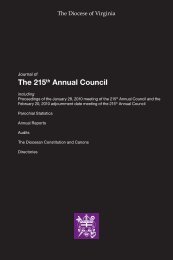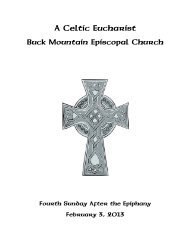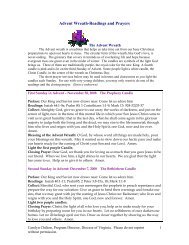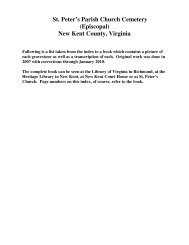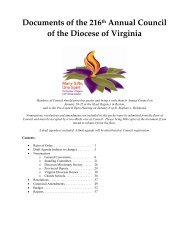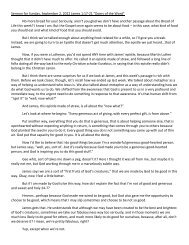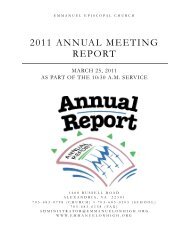Guidelines for Marriage & Remarriage - Diocese of Virginia
Guidelines for Marriage & Remarriage - Diocese of Virginia
Guidelines for Marriage & Remarriage - Diocese of Virginia
You also want an ePaper? Increase the reach of your titles
YUMPU automatically turns print PDFs into web optimized ePapers that Google loves.
Preface to the Diocesan <strong>Guidelines</strong><br />
The polices <strong>of</strong> the <strong>Diocese</strong> <strong>of</strong> <strong>Virginia</strong> <strong>for</strong> solemnization <strong>of</strong> marriage after divorce, consistent<br />
with the Canons <strong>of</strong> the Episcopal Church, are based on two Christian truths: that marriage is a<br />
lifelong union <strong>of</strong> a man and a woman, instituted <strong>of</strong> God, signifying the union between Christ and<br />
his Church; and that God, in his infinite mercy and redeeming love, creates new life in death,<br />
gives hope where there is despair, and <strong>for</strong>gives our sins. So the Church maintains its belief in the<br />
will <strong>of</strong> God <strong>for</strong> lifelong marriages that are signs <strong>of</strong> his steadfast love and at the same time, with<br />
no dilution <strong>of</strong> that belief, the Church may bless the unions <strong>of</strong> those whose prior marriages have<br />
died, and who, in faith, while accepting the consequences <strong>of</strong> their prior commitments, covenant<br />
with one another in a mature Christian marriage.<br />
These guidelines seek to assist persons in building strong marriages after the deaths <strong>of</strong> their prior<br />
marriages. The Church's experience has taught that time is necessary <strong>for</strong> healing, <strong>for</strong> learning<br />
and <strong>for</strong> <strong>for</strong>giveness. So the norm is that at least one year will have lapsed between the final<br />
decree <strong>of</strong> divorce and the date <strong>of</strong> the petition. (If one year has not elapsed, at least 18 months <strong>of</strong><br />
uninterrupted separation must occur be<strong>for</strong>e consent is granted.) The guidelines also seek to<br />
assist persons in resolving issues left from a prior marriage and in accepting responsibility <strong>for</strong><br />
commitments, such as child support, that continue from the prior marriage. The guidelines<br />
deliberately discourage unions that are <strong>for</strong>med in reaction to the stresses <strong>of</strong> a prior union; hence<br />
the emphasis on time to heal and time to settle issues from a prior union.<br />
When a person approaches the Church seeking to marry <strong>for</strong> the third or more time, the guidelines<br />
assume that additional pr<strong>of</strong>essional consultation is appropriate to assist the member <strong>of</strong> the clergy<br />
in the exercise <strong>of</strong> the pastoral ministry.<br />
These guidelines provide a minimum diocesan standard that places substantial responsibility <strong>for</strong><br />
judgment on the member <strong>of</strong> the clergy. The guidelines assume that the local pastor is in the best<br />
position to make the subjective judgments regarding the wisdom <strong>of</strong> the proposed marriage. The<br />
guidelines seek to provide a coherent framework in which that judgment is to be made and a<br />
consistent set <strong>of</strong> standards <strong>for</strong> the <strong>Diocese</strong> <strong>of</strong> <strong>Virginia</strong>.<br />
In most situations where there has been only one divorce or only one <strong>for</strong> each party, and where<br />
the member <strong>of</strong> the clergy can respond affirmatively to all questions on the Petition, episcopal<br />
consent will be granted.<br />
This process requires the conscientious attention <strong>of</strong> the clergy to the questions asked. The<br />
guidelines, it is hoped, will support the clergy in their ministry, simplify procedures where<br />
appropriate and maintain a diocesan-wide standard that is pastorally sensitive and theologically<br />
sound.<br />
<strong>Guidelines</strong> <strong>for</strong> Petitioning <strong>for</strong> Consent<br />
to Solemnize <strong>Marriage</strong>s after Divorce or Annulment<br />
1. The member <strong>of</strong> the clergy seeking the Bishop's consent to solemnize such a marriage<br />
petitions the Bishop using the Diocesan Petition. (The Petition is in addition to, and not a<br />
substitute <strong>for</strong>, the requirements <strong>of</strong> the Canons).


